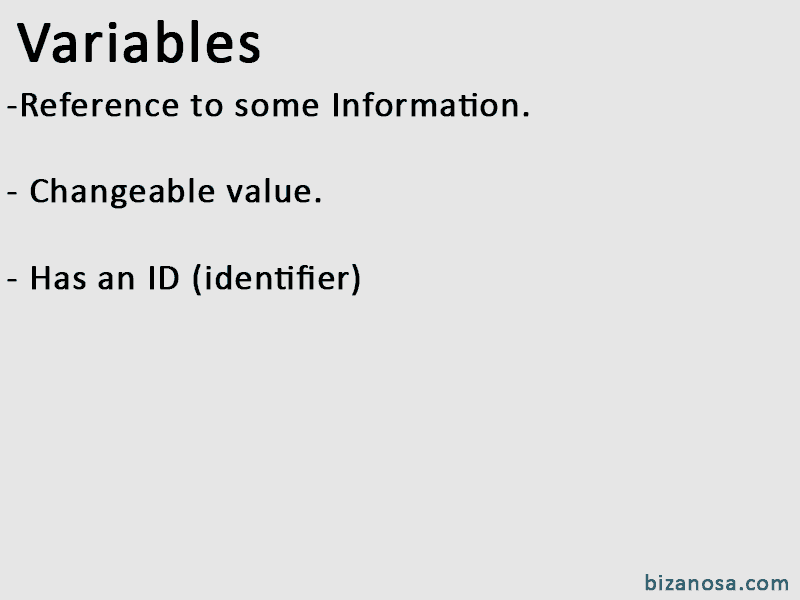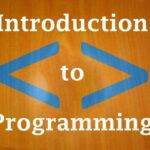Last updated on July 13th, 2020 at 01:30 pm.

What are Variables in programming ?
A variable is a reference to some information. This could be information you may need to use later on in your program .
For instance, assume you want to store two values 1001 and 12020 in your program so that later on you may use these values. The way that you will achieve this is by using variables.
The steps involved in storing and later using these values include:
- Create the variables with appropriate identifiers (names).
- Store your values of 1001 and 12020 in those two variables you’ve created . This is called assigning a value to a variable.
- Retrieve and use the stored values from the variables.
- Note that with variables you can change the values they store. For instance if you no longer need 1001 and 12020, you will just assign new values to your stored variable names.
Unlike constants in most programming languages, variables are changeable values.
A variable must have an identifier. Some programming languages are statically typed while others are dynamically typed. This is in reference to the data type the programming language can hold and execute in the variable once it is declared.
Statically typed
In strict programming languages such as C++ and Java, you must declare your variables before you can use them.In these programming languages once you declare a variable you cannot change the data type it can hold. For instance once you declare a variable as an integer, it can not be used to hold a string or a character because an integer is a number value. This is called static typing . These are statically typed programming languages.
Examples of statically typed programming languages: Java, C, C++, Haskell, Scala, Kotlin , COBOL,Ada, Rust, Pascal, C# etc .
Dynamically Typed programming languages
In dynamic typing , data types of your variables can be changed at run time. If you declare a variable as a number. Later on you could store a different data type in that variable and your program would still execute without any run time errors.
Certain programs such as Javascript, allows you to use a variable even before it has been declared. However in ecmascript 2015, there are limitations to this depending on the keyword definitions you use for defining your variables,
Examples of dynamically typed programming languages: Ruby, Javascript, Python, PHP, Clojure, erlang ,Lisp, Perl etc .
Examples of Variable declarations
Variable declaration in C
The following are some of the Variable data types in C . You need to use the correct one to declare your variable .For example if you want to store absolute negative or positive digits with no decimals you may use int .
| Type | Description |
| char | Typically a single octet(one byte). |
| int | Integer value |
| float | A single-precision floating point value. |
| double | A double-precision floating point value. |
| void | Represents the absence of type. |
How to declare variables in C – The syntax
data-type variable-identifier;
eg :
int tax;
If you want to declare a list of variables :
data-type variable-identifier0,variable-identifier1,variable-identifier2;
float price, profit,cost;
Initializing a variable in C :
Initializing a variable means , giving it an initial value when it is declared.
int tax = 16;
float price=199.99, profit= 57.2, cost;
Variable declaration in C++
Here is the complete list of fundamental types in C++:
| Group | Type names* | Notes on size / precision |
| Character types | char | Exactly one byte in size. At least 8 bits. |
| char16_t | Not smaller than char. At least 16 bits. | |
| char32_t | Not smaller than char16_t. At least 32 bits. | |
| wchar_t | Can represent the largest supported character set. | |
| Integer types (signed) | signed char | Same size as char. At least 8 bits. |
| signed short int | Not smaller than char. At least 16 bits. | |
| signed int | Not smaller than short. At least 16 bits. | |
| signed long int | Not smaller than int. At least 32 bits. | |
| signed long long int | Not smaller than long. At least 64 bits. | |
| Integer types (unsigned) | unsigned char | (same size as their signed counterparts) |
| unsigned short int | ||
| unsigned int | ||
| unsigned long int | ||
| unsigned long long int | ||
| Floating-point types | float | |
| double | Precision not less than float | |
| long double | Precision not less than double | |
| Boolean type | bool | |
| Void type | void | no storage |
| Null pointer | decltype(nullptr) |
Source : http://www.cplusplus.com/doc/tutorial/variables/
How to declare variables in C++ – The syntax
C++ is a direct child of the C programming language. This means that variable declaration in C++ is just like it is in C.
data-type variable-identifier;
eg :
int tax;
If you want to declare a list of variables :
data-type variable-identifier0,variable-identifier1,variable-identifier2;
float price, profit,cost;
Initializing a variable in C :
Initializing a variable means , giving it an initial value when it is declared.
int tax = 16;
float price=199.99, profit= 57.2, cost;
Example code in CPP:
CPP code to calculate Gross profit per unit
// operating with variables
#include <iostream>
using namespace std;
int main ()
{
// declaring variables:
float cost, sellingPrice, profit;
// process and initialization:
cost = 55.50;
sellingPrice = 119.99;
profit = sellingPrice - cost ;
// print out the result:
cout << "The profit is : " << profit;
// end program:
return 0;
}To run the above code, copy it and paste it here : http://cpp.sh
Read More about CPP variables .
Variable declaration in C#
Things to note :
– variables can be declared with or without modifiers. A modifier defines the scope of a variable, i.e. is it a public variable or a private variable. You will use these access modifiers to secure your variables appropriately.
– Variables defined without a modifier are only available within the methods in which they are defined. (Instance variables)
How to declare variables in C# – The syntax
Variable with a modifier
modifier dataType variableIdentifier;
example:
/*...public variable declaration...*/ private float cost, sellingPrice; /*...private variable declaration...*/ public float profit;
Assign initial value to variable
modifier dataType variableIdentifier = value;
Example:
/*...public variable declaration...*/ private float cost = 99.99, sellingPrice = 199.90;
Variable without a modifier
type variableName = value; // Usable and accessible within a method / object .
Example :
int age = 5;
Read more about types and variables .
Variable declaration in java
The following are acceptable and valid Java variables declaration
int x, y, z; // Declares three integers int x = 10, y = 10; // Example of variable initialization in Java byte B = 22; // initializes a byte type variable B. double pi = 3.14159; // declares and assigns a value of PI. char c = 'c'; // the char variable a is initialized with value 'c'
Variable declaration in Python
The following is valid code with variables in python
sales = 235 # An integer assignment sellingPrice = 99.90 # A floating point variable product = "Microphone" # A string variable assignment revenue = sellingPrice * sales # calculates revenue from the given variables # The Output via print print sales # outputs 235 print revenue # prints total revenue print product # Outputs Microphone
You can run the above code in ideone
Variable declaration in Javascript
Variable declaration in PHP
Points to note about PHP variables
- Variables are denoted with a leading dollar sign ($) e.g. $profit, $loss , $sellingPrice.
- The variable value is its most recent assigned value.
- Variables are assigned with the = operator, i.e. $profit = 20; .
- Variables can be declared before assignment or not.
- Variables in PHP are dynamic. refer up there for dynamically typed programming languages.
The following code is taken from the php manual here . It shows a sample of variable code in PHP
<?php
class foo {
var $bar = 'I am bar.';
var $arr = array('I am A.', 'I am B.', 'I am C.');
var $r = 'I am r.';
}
$foo = new foo();
$bar = 'bar';
$baz = array('foo', 'bar', 'baz', 'quux');
echo $foo->$bar . "\n";
echo $foo->{$baz[1]} . "\n";
$start = 'b';
$end = 'ar';
echo $foo->{$start . $end} . "\n";
$arr = 'arr';
echo $foo->{$arr[1]} . "\n";
?>To learn more about Programming, click the button below.

